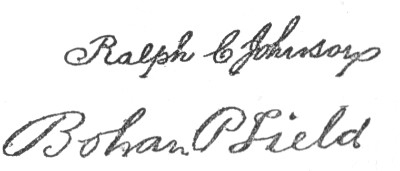| Web
and Book design,
Copyright, Kellscraft Studio 1999-2009 (Return to Web Text-ures) |
 (HOME)
|
A
Glimpse of Belfast Under Maine's
First Governor
By HESTER P. BROWN MEN
OF MAINE
The Pine Tree State
strict promise
gives,
Few lures that call in vain, But rugged soil and wholesome toil Give stalwart men of Maine. They ask no odds of fickle fate A livelihood to gain; Their rock and cold they turn to gold, The sturdy sons of Maine. To bring to us the wondrous stores The mighty seas contain, While others sleep, they search the deep, The fishermen of Maine. Afar upon the western slope And on the mid-west plain, Where trade invites, or gold requites, Are found the men of Maine. Yet in their thought their private good Does not with most obtain; In field or hall our country's call Counts first with men of Maine. "God bless the Massachusetts line!" Make that our proud refrain; For Washington, the battle won, Thus thanked the men of Maine.1 The grand old flag our fathers raised And bore without a stain, Still hold it high, as years roll by, Ye loyal men of Maine. 1 "Men from the counties of York and Cumberland." — J. L. Chamberlain.
ON A BRIGHT morning late in May, one thousand eight hundred and twenty, the packet "Superb," sailing from Boston to Belfast, carried among her passengers two persons for whom the lovely shores of Penobscot Bay held a peculiar interest. One, a middle-aged man, looked curiously for the changes brought about during an absence of sonic years; the other, a young girl at his side, gazed admiringly at the panorama of hills and inlets and wooded isles unfolding before her. As they neared the end of their journey, both noted the large number of sailing craft in the harbor — that harbor of which William White in 1827 said: "The British navy might float in it commodiously." "We shall see the town presently," said the man, pointing to the right bank. "There, now!" as they caught sight of the clustered buildings on lands sloping to the shore. "Don't you think you will like to live here a year with your aunt'?" "Maybe, sir; I can tell better after I have seen my aunt," answered the girl with a teasing smile. "You will like your aunt, Jennet, everybody does. And she will teach you the things all women ought to know — to spin and sew and manage a house. 'Lizabeth used to be great on 'lection cake," he said reminiscently. "It's like to be extra good and big this year." Then there was the bustle of landing — passengers looking up their baggage, sailors making fast to the wharf, the noisy running of ropes and a general accentuation of the all-pervading tarry smell. "We are in early," said Jennet's father, "and I'll leave you at the tavern for a bit while I see about a conveyance to take us the two miles we have to go." So Jennet looked out at the "Babel" and anything else within her range of vision, till her father came around with a neat wagon and driver, and the two proceeded along a rough and muddy road on the last stage of their journey. Aunt 'Lizabeth was a large, wholesome, hearty woman, who carried her fifty years lightly. Joseph Whipple must have had that type in mind when he wrote of "the females of the District of Maine:" "Their fine, healthy appearance and easy manners are probably not exceeded in any country." Jennet decided to like her; a conclusion which was sure to make things pleasanter all 'round. It was baking day and when the door of the great brick oven was opened, the savory odors floated through the kitchen and into the front room in which Jennet, as an honored guest, had been seated. Everything in the room bespoke industry and thrift. The carpet, as she afterwards learned, had been carded, spun, colored and woven by Aunt 'Lizabeth's own hands out of "tag locks" or inferior wool, in a year when wool sold slowly. More of Aunt 'Lizabeth's handiwork appeared on the wall in the shape of a sampler wrought with colored silks in various fancy stitches. The furniture was heavy, handsome, and, like all of Aunt 'Lizabeth's belongings, including Uncle Daniel, well-kept. 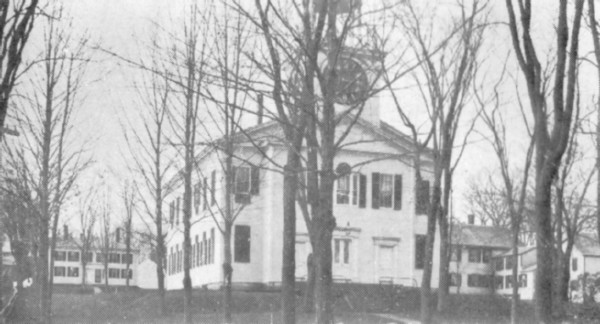 First Parish Meeting House, Built 1813 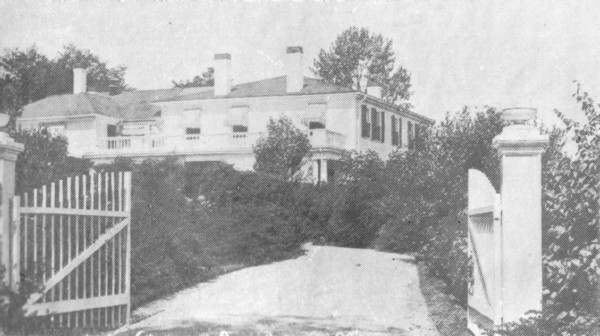 Governor Crosby Homestead, Built 1803, Restored 1900 "We didn't really look for you till afternoon, or some one would have gone to the village to fetch you," apologized Aunt 'Lizabeth as she bustled about the kitchen whither Jennet had gone in quest of human companionship. "Your father's gone out to see the menfolks till dinner time. I told him to bring 'em right along in before it is too late." At dinner there were the "men-folks" — Uncle Daniel and his two stalwart sons — and the "bound girl" who helped Aunt Elizabeth with the house work and who viewed Jennet and her father with lively interest. The meal was served in the large kitchen, where steaming pots hung on the crane and where all the appointments suggested a table where there was "always room for one more" — or, indeed, for several more. Aunt 'Lizabeth, flushed and cheery, beamed on her guests as Uncle Daniel, after a short grace, served portions of the pickled pork, greens and potatoes. Aunt 'Lizabeth's bread was the envy of her neighbors, and there were goblets of milk for those who did not care for "hot drink," and turnovers — mince turnovers — for dessert. So passed Jennet's first dinner in Belfast. On Sunday the family walked two miles to attend service at the First Parish Church. This church was the pride of the town. Well located, "originated, prosecuted and finished in great harmony"1 in 1818, and with a Paul Revere bell,2 hung in the following year, it was the most notable building in Belfast. In the high white pews, each with its green door fastened by a large wooden button, well-bred children were neither heard nor seen, though they were present in numbers. From his pulpit, on a level with the galleries, the Rev. William Frothingham delivered a graceful, scholarly sermon, and the choir sang from "Watts's Selection;" while a tithingman kept vigilant, though unobtrusive, watch of the manners of the congregation. "A fine church you have here, 'Lizabeth," said Jennet's father, as they walked home. "Yes, William," rejoined Aunt Elizabeth; "but meeting-houses and creeds and ministers are a good deal like children — sometimes they're a bond of union, and again they're a bone of contention. Did you mind Cousin Harriet and her two girls settin' in their pew while John with the other children was over worshippin' at the other place? And John and Harriet are both as good as gold, and sure, you might say, to go to heaven; only they can't travel by the same road. And other families are divided on Sunday. Of course you've heard?" "Yes, but you see, Elizabeth, each must 'work out his own salvation.' He can't make a family matter of it." *
* *
In the next week Jennet's domestic education began, but there was time for frequent trips to "the village" with her father, who liked to point out the familiar landmarks — the five hills on which Belfast was built, with the Field homestead crowning one, the Crosby homestead upon another; and in the lower part of the town the Academy in the midst of its ample grounds. The ship-yards, too, were a source of interest though no vessel was now upon the stocks. Here within a few years had been built the "Abigail," the "Packet," the "Superb," the "Rambler" and others. Here Jennet delighted in the scent of the salt sea air while she listened to "what the waves were always saying." On the thirty-first day of May, that day when for the first time Maine elected a governor all her own, Aunt Elizabeth served one of her very best salmon dinners, and in the afternoon and evening cake and wine were offered to any callers. These festivities were designed both to welcome in the new administration and to "speed the parting guest," for Jennet's father would sail for Boston the next day. Now the spinning lessons began in earnest. Every day Jennet had her "stent" to do; and in the long afternoons — very long afternoons they were when the noon meal was despatched at eleven o'clock by the sun — Aunt 'Lizabeth told stories of the Penobscot expedition of 1779, when the settlers of Belfast, "to the last man, abandoned their homes, leaving their flocks in the pastures, and the corn in the fields ready for harvest."3 One citizen lowered a box of silver into his well whence he recovered it after the "little unpleasantness" was over. Then there was the story of the Miller brothers, James and Robert, who "aided and abetted" General Wadsworth and Major Burton on the occasion of their escape from Fort George, Castine.4 The fugitives reached Belfast tired and hungry, but dared not stop at the home of the elder Miller, who was known to be their friend; so the two young men led them a mile into the wilderness and there built a rude camp of evergreen trees. Evergreen boughs made a comfortable bed, and the Millers furnished blankets, food, and later a pocket-compass to help them out of the woods. There were tales, too, of that foggy morning in September, 1814, when the British marched on Hampden. How the resistance of the militia drew on the town the vengeance of the rank and file of the enemy; how some inhabitants fled without even a change of clothing; how valuable libraries were "wantonly destroyed;" how "sailors amused themselves with ripping open beds and turning the feathers on to the mill while in motion."5 and how one young officer "went gunning," shooting all the sheep, pigs and fowl which he found on his ride of two or three miles above the river. Then, to stimulate Jennet's interest, Aunt 'Lizabeth would tell of the famous spinning party in Portland — one of the great events of her youth — which is thus recounted in Williamson's History of Maine: "In May, 1788, an hundred females among the best families, stirred by a spirit of emulation and benevolence, convened at the house of their minister in Portland and presented his wife with 236 skeins of cotton and linen as the fruits of their afternoon's labor and skill, from the turn of only sixty wheels; and in the evening, a large concourse assembling, was entertained with a concert of sacred music." Jennet was becoming fairly proficient as a "spinster," when, one morning, she took her wheel to the open door and began winding the yarn from the spindle upon the reel, keeping time to the old lines: "There's four,
There ain't four; There will be four; By and by." As she stood there in her blue cotton gown, with the freshness of the June day glowing in her cheeks and shining in her eyes, while the sun turned her brown hair to threads of tawny gold, a young man approached — Boyd Cochran, yeoman, as he is designated in sundry papers executed when Belfast was "in the County of Hancock and Commonwealth of Massachusetts," and attested in the delicate chirography of
He was one of the neighbors to whom Jennet had passed cake and wine on election day, and he paused "to pass the time o' day." That evening he remembered that Uncle Daniel was good authority on standing timber and he called 'round to ask his advice on an intended purchase. And Aunt 'Lizabeth smiled over her knitting. When he went home Boyd was vaguely thankful for some things which he had never consciously considered before; as, that he owned the best sawmill on the river; that his father, John Cochran, had devoutly, "in the Name of God, Amen," bequeathed to his children some excellent farming lands; most of all, that his health and strength and unspoiled ardor made him the peer of younger men; for among the neighbors he had long been considered "an old bach." So Jennet's romance began. In due time a letter announcing his safe arrival6 in Boston was received from Jennet's father. Aunt 'Lizabeth rejoiced at the news, but, withal, eyed the letter disapprovingly. "Two pieces!" said she. "Double postage! When he might just as well said all he had to say on one piece! But that's just like William." At this time the postage on a single piece of paper was twelve and one-half cents for a distance of one hundred and fifty to two hundred and fifty miles. Two pieces called for double postage; and in Belfast in 1820 twenty-five cents would buy two pounds of butter or six pounds of beef. So Aunt Elizabeth's attitude was not so singular, after all. *
* *
On this Fourth of July Belfast was as noisily patriotic as her limited public equipment would allow. The two field pieces were fired again and again, and the one church bell pealed forth jubilantly. A public dinner was served at the Sun Tavern (nobody said "Pumpkin Tavern" today in the face of the excellent repast provided by Landlord Cunningham) and it was largely attended. Jennet, in a gown of flowered silk, and a necklace that two grandmothers had worn before her, went as the guest of Cousin Harriet. There were toasts and speeches and at intervals patriotic selections were rendered by musicians stationed in the alcoves, one at either side of the great chimney, in the front parlor. The Hon. John Wilson presided at this dinner, and the toast he gave has been preserved to us: "Maine an independent State. May her Legislators possess the patriotism of Fox and the intelligence of Pitt; her Judges, the science of Mansfield and decision of Holt; her Orators, the lightning of Cicero and the thunder of Demosthenes."7 Among Mr. Wilson's auditors were, in all likelihood, two future governors of Maine, — Hugh Johnston Anderson and William George Crosby. 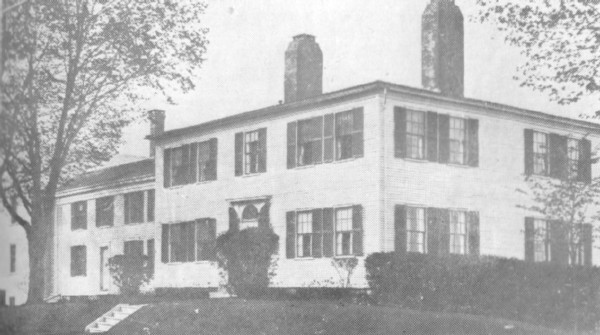 Bohan P. Field Homestead, Built 1807 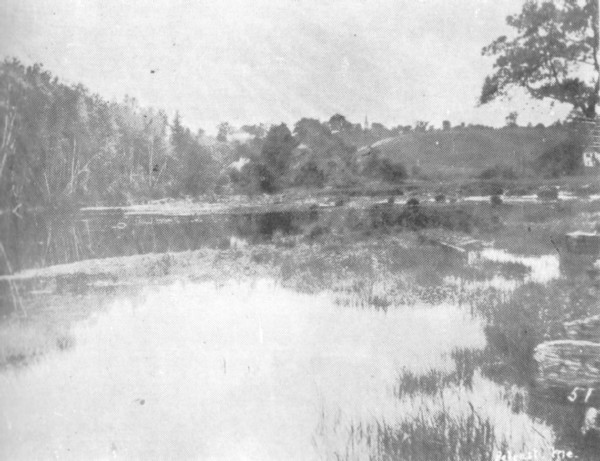 The Loveliest Place in the World Two days after the dinner, when Uncle Daniel came home from "the village," he took from his pocket a newspaper and spread it ostentatiously upon the table. It was not such a very large paper. It measured, to be exact, eleven inches by seventeen inches.8 But it filled a long-felt want with Uncle Daniel. "There!" said he, "we won't have to be dependent on Bangor for our news now, and Belfast half as large again as Bangor9 few years ago! Here is the first number of the 'Hancock Gazette,' published this sixth day of July, 1820, by Ephraim Fellows and William R. Simpson — good luck to 'em!" The family read every word of that paper, even to the advertisements; and as these last may be of interest to us we may look over Uncle Daniel's shoulder and learn that: H. J. Anderson advertises a supply of rum; J. S. Kimball offers ten hogsheads of New England Rum; 10Dudley Griffin, Tailor, directly opposite the Post-office, makes military uniforms; B. Whittier, Postmaster, publishes a list of forty-eight uncalled-for letters; Travellers are invited to call at the "Sign of the Sun." *
* *
On a midsummer afternoon Jennet was walking with Annis Cochran along the riverside, when suddenly Boyd appeared beside them. "Do you think this valley is pretty?" "Yes, more than pretty — it's the loveliest place in the world," said Jennet. "I'm thinking of building a house right here," Boyd said, indicating a tiny plain behind which the ground rose in terraced hills to the north and west, while the winding river flowed placidly a few rods to the south. "I cal'late to start a crew on the cellar next week." So the work began, and soon Jennet had promised to live in the house when it was done. Aunt 'Lizabeth found her an apt pupil these days and the little wheel — for she was using the flax wheel now — twirled merrily. Annis Cochran took her brother to task for his haste in wooing; "but," said he, with a humorous smile, "Jennet is of proper age, and no amount of waiting will make me any younger!" So the lovers, on pleasant evenings, walked to the valley to see how the work went on. Jennet watched the building of the arches, each with its heavy keystone to bear the weight of the great chimneys. All Boyd's plans were generous. There were to be six mammoth fire-places and two brick ovens. And with shy delight Jennet watched the foundation grow. The best of timber was fitted for the frame — "For," said Boyd, "why shouldn't a man put good timber into his house when he has the pick of a woodlot and a sawmill of his own to boot?" And when everything was ready the men of the neighborhood gathered for the raising. The Cochrans kept open house that day. There was plenty to eat, and, of course, plenty to drink. Afterwards there were jokes and laughter and the master workman gave, in a sonorous voice, the sentiment of the company: "Here stands a fine
frame on a
pleasant spot,
Bless the owner and all he's got. If he keeps on as he's begun, He'll be rich before he's done." *
* *
In late September there was a notable funeral in the town — that of Mr. John Huse, late of "Huse's Tavern." Funerals in general did not appeal to Jennet; but they certainly did to many people of that day. Perhaps it was because there was a "social hour," so to speak, after the services, a time when scattered kinsfolk and neighbors might exchange greetings. This funeral was held in the meeting house and the bell was tolled, — not for the first time on such an occasion, but it was still a new feature. To please her aunt, then, Jennet went. The hymn sung11 was the one perpetrated by Isaac Watts, beginning "Hark! from the tombs a doleful sound," — and, shuddering, Jennet slipped her little hand into Aunt 'Lizabeth's big, comfortable one for cheer. Other details of that funeral might be forgotten, but the hymn, never. The new house was not to he finished until spring and the wedding day was to be in early June. There was much to do. Jennet wanted to weave a counterpane of the "chariot wheel" design. Aunt 'Lizabeth had one in white, and one in blue and white; and she had offered to teach Jennet and to help in the work. For entertainment there were the singing school and the quiltings — the "thimble parties" of that day, differing from the ordinary modern affair in that husbands and lovers were usually invited to tea. Late in the winter there were skating and sleighing parties, for the bay was frozen over even to Castine. Through Cousin Harriet's connection with the "Belfast Social Library Society," too, Jennet had access to books other than those found in Uncle Daniel's modest library. The books of the "Belfast Social Library" were intended for use, as evidenced by the stout covers placed upon them.12 In the early winter a fire broke out on Main Street, but "the weather being calm, and the town pump in good order," only two buildings were burned. A "bucket brigade" in which women took places in the line, did good service at this fire. Shortly after, a "Fire Club" was formed which admitted to membership every citizen "who shall furnish himself with two good substantial leather buckets, twelve inches in length and eight inches in diameter, marked with his name; and a good substantial bag, four feet in length and two feet three inches in breadth, marked with his name." But the name, however plainly written, would not always protect the bucket. On one occasion a respected "Fire ward," Peter Rowe, saw an unlettered citizen of the suburbs making off with his buckets. "Hold on, there," said he, laying hands on the man, whom for convenience we will call John Smith, "those are my buckets." "No, they ain't," said Smith; "they're my buckets." "But here are my letters," insisted the "Fire ward." "P for Peter, and R for Rowe; Peter Rowe." "Yes, there's P for John and R for Smith. Them's my buckets, Peter Rowe." But Rowe got his buckets.13 *
* *
In late March, when the breath of spring was in the air and the sun set in a glory of gold and crimson, Boyd and Jennet walked along the valley to look at the new house. They loitered so long that the stars were out, filling the sky with a radiance even lovelier than that of the sunset, when they took their way homeward. Suddenly Jennet said, with her provoking smile: "After we have lived in the new house a very long time will we, perhaps, go to different churches?" And her lover replied, with perfect sincerity, "You are my religion, Jennet." Next day Boyd went far into the country to look at a lumber lot. The trip that was to take three of four days consumed more than a week. It was late in the night when he came again into the familiar neighborhood and looking toward Jennet's home he could see a light showing dimly. "What are they up at this time for?" he thought, uneasily. At his own home, too, a light was burning. As his steps sounded on the door stone, Annis came to meet him, her face the picture of grief. There was no need to say that Jennet was dead. He knew it. He hardly noticed when some one told him that she died from congestion of the lungs and that the doctors had done all that could be done to save her. His love dream had come late in life, gaining intensity, perhaps, by the way, — and this was the end. Later the new house was finished, finished modestly, as became a house whose owner was bankrupt in heart and purse; and Boyd and Annis Cochran lived their lives there — "an old man and an old maid; two weaknesses supporting each other." Later, after they had been carried to the graveyard on the hill that had been a part of their patrimony, others of their blood lived in the house, and there came little children who loved the fields and the river. *
* *
In the streets where, in the days of the first governor, patient oxen drew heavy loads and the chaise marked the progress of gentility, now auto trucks are seen and touring cars speed their joyful way. In the harbor the steamship and the motor boat have taken the place of the "Superb" and all her kind. But a few of the old houses, still centers of delightful hospitality, remain; and many a wanderer, Belfast born, echoes the words written by Mrs. Rebecca Palfrey Utter, twenty years ago: "One playmate I
should find
unchanged to-day,
The never-resting waters of the bay. 'Time writes no wrinkles on its azure brow;' In the cold moonlight it is sparkling now." _____________________ 1 William White in "History of Belfast." 2 "On the old 'stock book' of Paul Revere & Son the above bell is number 219 and its weight is given as twelve hundred and sixty pounds. The date of the entry is 17 February, 1820, and its location was to be Belfast, Me." — Williamson's History of Belfast, Vol. 2. 3 White: History of Belfast, p. 42. 4 White and Williamson both mention this occurrence. 5 Joseph Whipple in History of Acadie, Penobscot Bay and River. p. 97. 6 "Those who go down to the sea in ships" were peculiarly subject to discomfort in earlier times. In the autumn of 1820 the "Superb," carrying twenty-one passengers from Belfast to Boston, was blown off her course and was not heard from for seventeen days. 7 Crosby's "Annals." 8 It is pleasant to be able to record that with the fourteenth number the management felt justified in increasing these dimensions -- by one inch. 9 According to the census of 1810 the population of Belfast was 1274, while that of Bangor was 850. 10 Among our forefathers the consumption of rum seems to have been both considerable and general. In Williamson's History of Belfast, Vol. I, p. 751, is mentioned a bill for a pauper's funeral in which two items are: Coffin, $1; Rum, $4. 11 Crosby's "Annals." 12 Among the first charges of the librarian are: Paid Wm. Dunham for two sheepskins for covers, $1.00. — Williamson's History of Belfast. 13 These buckets marked P. R. were, a few years ago, and probably still are, in the possession of Mr. Edward R. Pierce of Belfast. |
